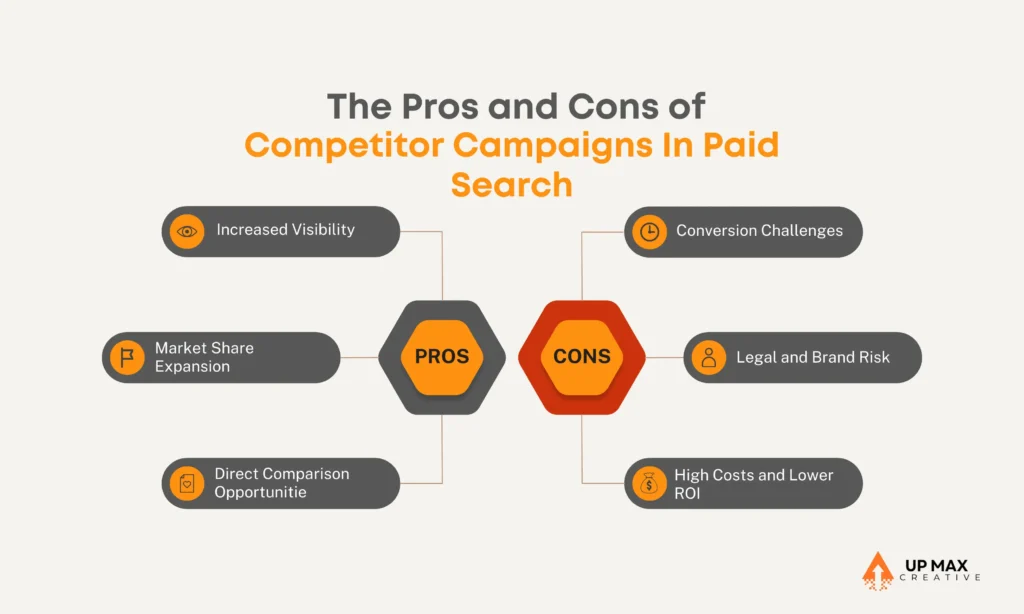
In the competitive world of paid search advertising, businesses often explore every tactic that could potentially lead to an advantage, and competitor campaigns are one such strategy. These campaigns involve bidding on keywords that are closely associated with competitors’ brand names and products. While this approach can offer immediate visibility and potential market share gains, it also comes with its own set of challenges and ethical considerations. This article explores the pros and cons of engaging in competitor campaigns in paid search advertising.
Understanding Competitor Campaigns in Paid Search
Competitor campaigns in paid search are strategies where businesses use their competitors’ brand names and product-specific keywords in their own PPC (pay-per-click) campaigns. The goal is to appear in search engine results when potential customers search for a competitor’s products, thereby diverting traffic and possibly converting competitors’ consumers.
The Pros of Competitor Campaigns
Engaging in competitor campaigns can offer several benefits, including:
Increased Visibility
By bidding on competitors’ keywords, companies can enhance their visibility among audiences who are already interested in similar products or services, potentially capturing attention at a crucial decision-making moment.
Market Share Expansion
Competitor campaigns can be an effective way of entering a market or increasing market share, especially in industries where certain brands dominate customer mindshare.
Direct Comparison Opportunities
These campaigns allow businesses to position their products or services directly against a competitor’s offerings, highlighting unique selling points and differences that could sway buyers’ preferences.
The Cons of Competitor Campaigns
Despite their potential benefits, competitor campaigns carry several risks and downsides:
High Costs and Lower ROI
Keywords associated with well-known brands can be costly due to high competition and lower click-through rates (CTRs), as consumers searching for a specific brand might not click on another brand’s ad.
Legal and Brand Risk
Legal challenges may arise from using competitor names in advertisements, particularly if they violate trademark laws. Additionally, consumers may perceive these tactics negatively, potentially impacting brand reputation.
Conversion Challenges
Even if these campaigns drive traffic, converting that traffic into actual customers can be challenging. Visitors may bounce if they realize the content isn’t what they were originally searching for, leading to wasted ad spend.
Best Practices for Competitor Campaigns
To mitigate the risks and maximize the effectiveness of competitor campaigns, consider the following best practices:
Careful Keyword Selection
Choose keywords that are relevant but not trademarked. Focus on generic product categories or service types where your offerings overlap with your competitors’.
Clear Value Proposition
Ensure that your ads clearly articulate how your product or service is different or better than what the competitor offers. Avoid deceptive practices that might confuse customers
Landing Page Optimization
Design landing pages specifically for these campaigns that address the needs of customers who might be considering competitors’ products. Ensure your landing pages provide customers with clear and compelling reasons to choose your brand.
Continuous Monitoring and Adjustment
Closely monitor the performance of competitor campaigns. Adjust bids, ad copy, and landing pages based on performance data to ensure optimal ROI.
Competitor campaigns in paid search can be a double-edged sword. While they offer opportunities for increased visibility and market expansion, they also come with high costs, potential legal risks, and ethical dilemmas. Businesses must weigh these factors carefully, considering both the short-term gains and the long-term brand implications. By adhering to best practices and constantly optimizing strategies, companies can effectively leverage competitor campaigns to enhance their digital marketing efforts.
FAQs
What are the ethical considerations of competitor campaigns in paid search?
How can I ensure my competitor’s campaigns are legal?
How do I measure the success of competitor campaigns?
Measure the success of competitor campaigns by tracking key performance indicators (KPIs) such as click-through rates, conversion rates, and return on investment.
Are competitor campaigns suitable for all industries?
Competitor campaigns can be suitable for most industries, but their effectiveness depends on market dynamics and the specific competitive landscape of each industry.
In summary, while competitor campaigns offer a tactical advantage in paid search, they require careful implementation and ongoing management to ensure they contribute positively to a company’s overall marketing strategy.